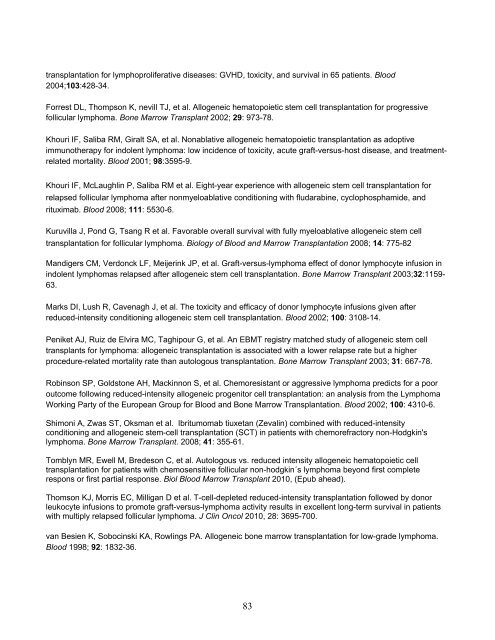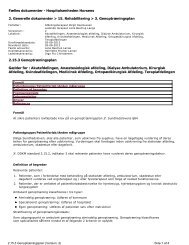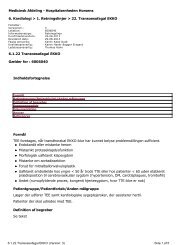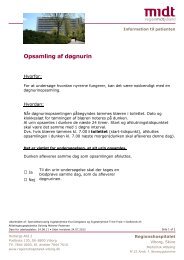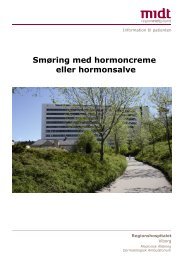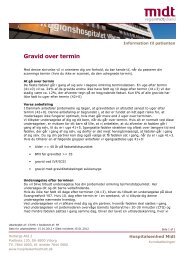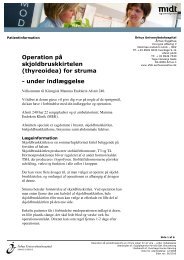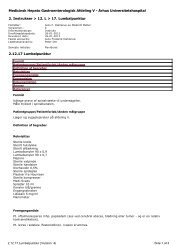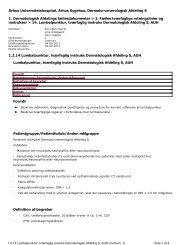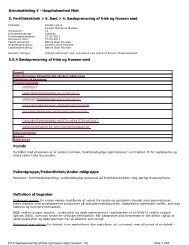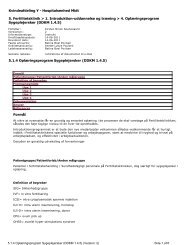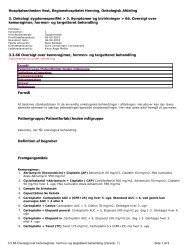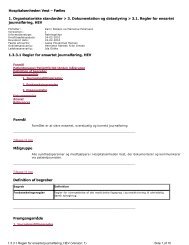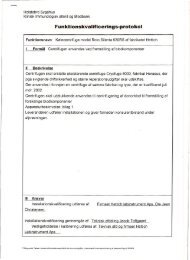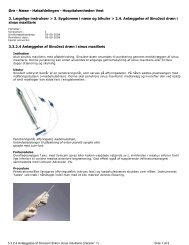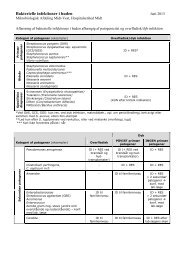12.5.2.30 DHS rekommandationer for KMT 2011.pdf - e-Dok
12.5.2.30 DHS rekommandationer for KMT 2011.pdf - e-Dok
12.5.2.30 DHS rekommandationer for KMT 2011.pdf - e-Dok
Create successful ePaper yourself
Turn your PDF publications into a flip-book with our unique Google optimized e-Paper software.
transplantation <strong>for</strong> lymphoproliferative diseases: GVHD, toxicity, and survival in 65 patients. Blood<br />
2004;103:428-34.<br />
Forrest DL, Thompson K, nevill TJ, et al. Allogeneic hematopoietic stem cell transplantation <strong>for</strong> progressive<br />
follicular lymphoma. Bone Marrow Transplant 2002; 29: 973-78.<br />
Khouri IF, Saliba RM, Giralt SA, et al. Nonablative allogeneic hematopoietic transplantation as adoptive<br />
immunotherapy <strong>for</strong> indolent lymphoma: low incidence of toxicity, acute graft-versus-host disease, and treatmentrelated<br />
mortality. Blood 2001; 98:3595-9.<br />
Khouri IF, McLaughlin P, Saliba RM et al. Eight-year experience with allogeneic stem cell transplantation <strong>for</strong><br />
relapsed follicular lymphoma after nonmyeloablative conditioning with fludarabine, cyclophosphamide, and<br />
rituximab. Blood 2008; 111: 5530-6.<br />
Kuruvilla J, Pond G, Tsang R et al. Favorable overall survival with fully myeloablative allogeneic stem cell<br />
transplantation <strong>for</strong> follicular lymphoma. Biology of Blood and Marrow Transplantation 2008; 14: 775-82<br />
Mandigers CM, Verdonck LF, Meijerink JP, et al. Graft-versus-lymphoma effect of donor lymphocyte infusion in<br />
indolent lymphomas relapsed after allogeneic stem cell transplantation. Bone Marrow Transplant 2003;32:1159-<br />
63.<br />
Marks DI, Lush R, Cavenagh J, et al. The toxicity and efficacy of donor lymphocyte infusions given after<br />
reduced-intensity conditioning allogeneic stem cell transplantation. Blood 2002; 100: 3108-14.<br />
Peniket AJ, Ruiz de Elvira MC, Taghipour G, et al. An EBMT registry matched study of allogeneic stem cell<br />
transplants <strong>for</strong> lymphoma: allogeneic transplantation is associated with a lower relapse rate but a higher<br />
procedure-related mortality rate than autologous transplantation. Bone Marrow Transplant 2003; 31: 667-78.<br />
Robinson SP, Goldstone AH, Mackinnon S, et al. Chemoresistant or aggressive lymphoma predicts <strong>for</strong> a poor<br />
outcome following reduced-intensity allogeneic progenitor cell transplantation: an analysis from the Lymphoma<br />
Working Party of the European Group <strong>for</strong> Blood and Bone Marrow Transplantation. Blood 2002; 100: 4310-6.<br />
Shimoni A, Zwas ST, Oksman et al. Ibritumomab tiuxetan (Zevalin) combined with reduced-intensity<br />
conditioning and allogeneic stem-cell transplantation (SCT) in patients with chemorefractory non-Hodgkin's<br />
lymphoma. Bone Marrow Transplant. 2008; 41: 355-61.<br />
Tomblyn MR, Ewell M, Bredeson C, et al. Autologous vs. reduced intensity allogeneic hematopoietic cell<br />
transplantation <strong>for</strong> patients with chemosensitive follicular non-hodgkin´s lymphoma beyond first complete<br />
respons or first partial response. Biol Blood Marrow Transplant 2010, (Epub ahead).<br />
Thomson KJ, Morris EC, Milligan D et al. T-cell-depleted reduced-intensity transplantation followed by donor<br />
leukocyte infusions to promote graft-versus-lymphoma activity results in excellent long-term survival in patients<br />
with multiply relapsed follicular lymphoma. J Clin Oncol 2010, 28: 3695-700.<br />
van Besien K, Sobocinski KA, Rowlings PA. Allogeneic bone marrow transplantation <strong>for</strong> low-grade lymphoma.<br />
Blood 1998; 92: 1832-36.<br />
83


